25 years later, these Coyotes still wander the desert aimlessly
Ten days into the Phoenix Coyotes' first season in the desert, Joe Gilmartin praised the club for spending to score a foundational star. Gilmartin was a veteran basketball columnist moonlighting as an authority on hockey, and on Oct. 15, 1996, he explained to Arizona Republic readers the merits of signing Jeremy Roenick long term. Twice a 50-goal scorer with the Chicago Blackhawks, Roenick, 26, decided to hold out when the Coyotes traded for him that summer. His bosses wound up paying him $20 million over five years.
"Even if you can't tell a hockey puck from a frozen bagel (the bagel's the one with a hole in it)," Gilmartin wrote, "you have to be impressed with the way owners Richard Burke and Steven Gluckstern are going about what executive vice president of hockey operations Bobby Smith calls 'transferring the Winnipeg Jets into an elite NHL team.'"
Optimism trended in Arizona 25 years ago this month. Before the Coyotes' first home game, Gary Bettman likened the occasion to when Wayne Gretzky set the NHL career goals record, remarking to the Republic that both were magical moments. The commissioner was intent on growing hockey in the south, delivering teams to Anaheim, Dallas, and Sunrise, Florida, in 1993 alone. Burke originally wanted to relocate the cash-strapped Jets to Minnesota, his home state. Negotiations stalled and he settled on Phoenix instead.
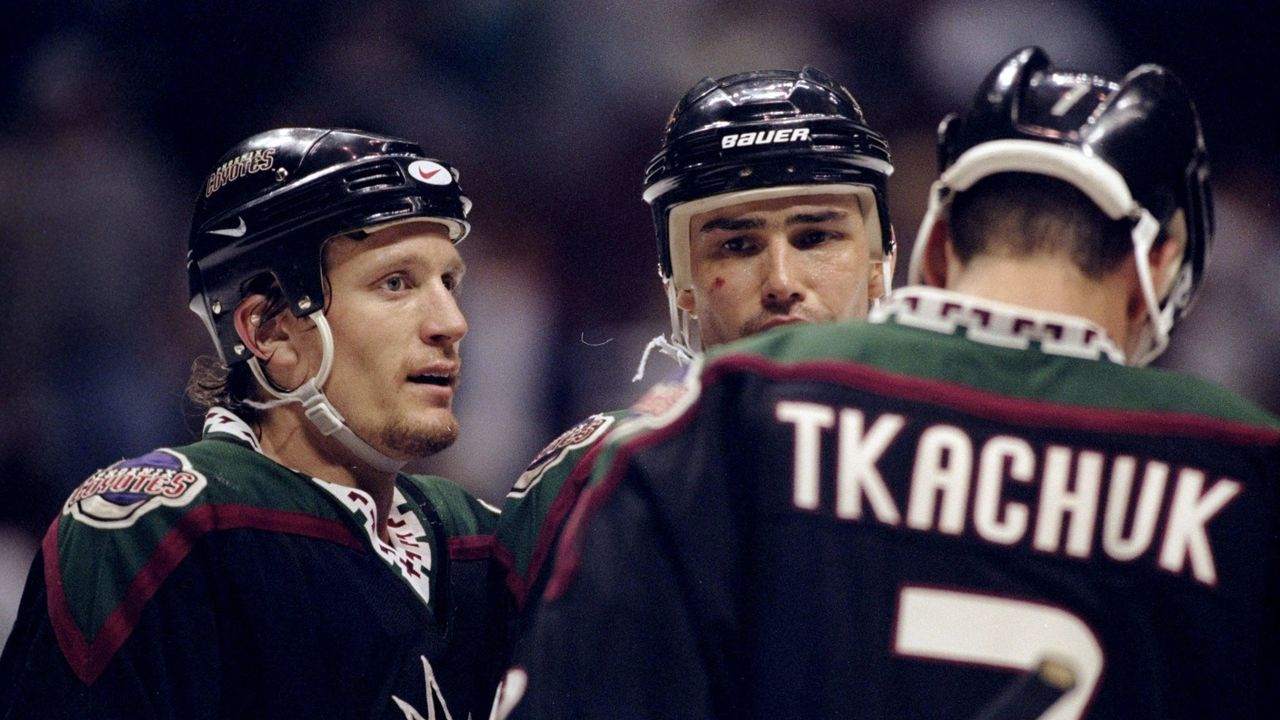
New identity markers materialized in this untapped market. "Coyotes" edged "Scorpions," "Dry Ice," and "Phreeze" in a public name-the-team contest. The club's primary logo, a coyote clutching a stick, was shaped like an 'A' and designed to resemble a Native American kachina figure. Phoenix Suns owner Jerry Colangelo, who helped broker the NHL's arrival, suggested fans celebrate goals by hurling plastic scorpions over the glass, like the rubber rats thrown at Florida Panthers games. Assistant captain Kris King objected; he'd walloped a live scorpion with his sandal at an area hotel when the critter scuttled across his foot.
King and his teammates touched down in Arizona as ambassadors of a curious sport. The Republic's preview coverage included definitions of key terms: five-hole, line change, power play, slap shot. King, Keith Tkachuk, and an Elvis impersonator paraded a Zamboni through downtown to get people talking about the Coyotes. To explain why he thought Tkachuk, a 50-goal power forward, would become a fan favorite, general manager John Paddock compared him to a football player.
Ahead of the season, Tkachuk asked others to trust him when he explained why Phoenix would "fall in love" with hockey: "Goals. Plenty of action. Hits like you've never seen. Great saves. Awesome passes. Huge plays. It just goes on and on."
The Jets departed Winnipeg as a playoff team, stoking Paddock and Smith's belief that the Coyotes might soon contend for Stanley Cups. King opened the scoring in the home opener, a 4-1 defeat of the San Jose Sharks at America West Arena. The sellout crowd mimicked coyote howls. That the temperature outside eclipsed 100 F was part of the charm, Coyotes president Shawn Hunter told the crush of Canadian reporters in attendance.
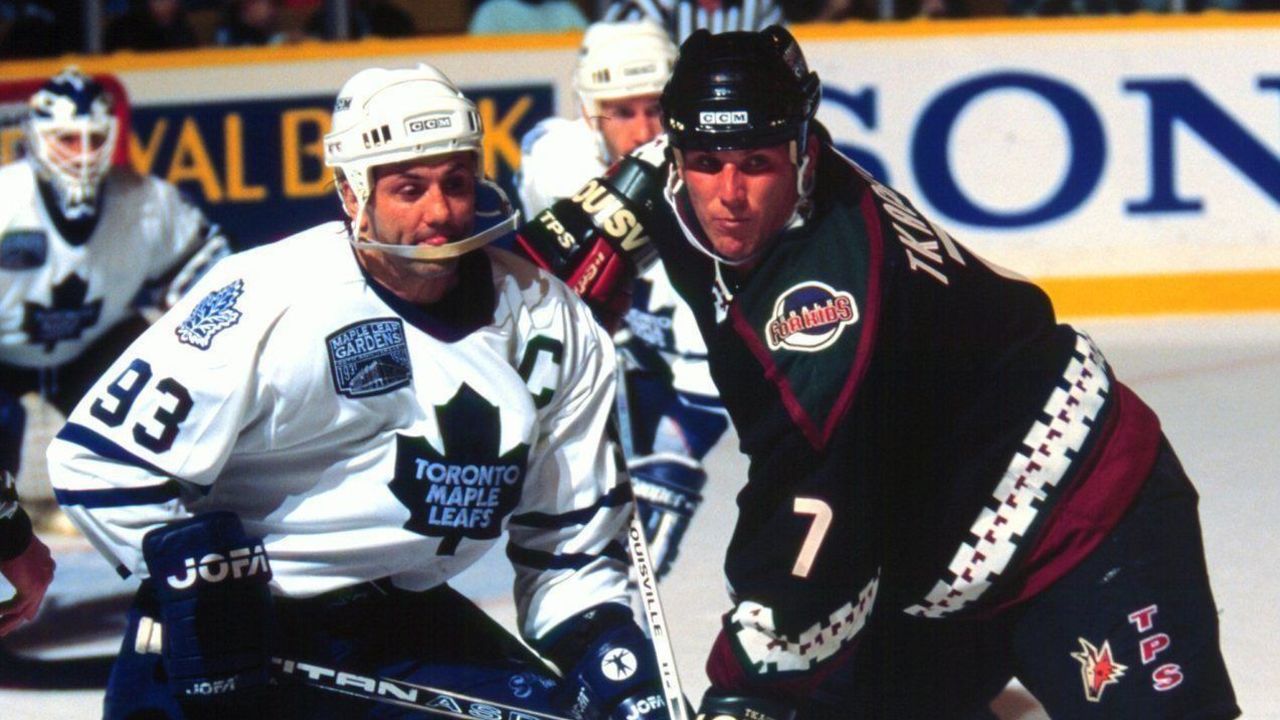
But within a few weeks, Phoenix went winless in seven straight at home, and Gilmartin was souring on the experience. Recapping a drab 4-1 loss to the Colorado Avalanche, he wrote in the Republic that Burke and Gluckstern had spent to win, "but the bang they are getting from those big bucks is so small that you couldn't hear it above the boos that ushered the Coyotes off the ice." Chuckling at the question, Burke denied to Gilmartin that he'd booed the players, too.
"But I certainly could have," Burke said at the time. "I'm a hockey fan as much as a hockey owner, and the way we're playing certainly doesn't make for very exciting hockey. Hopefully, we will get our act together before too long."
To take stock of the Arizona, née Phoenix, Coyotes at 25 years old is to think about a franchise that's "constantly in some sort of financial turmoil," sports economist Victor Matheson said. Monetary losses, operational instability, and hard luck have bedeviled the Coyotes for decades. This club has gone bankrupt, been league-owned for several seasons so that it wouldn't return to Canada, and it employed hockey's greatest player as a coach who never made the playoffs. Season 25 begins next week as the Coyotes seek a new home. The city of Glendale, where they've played since 2003, intends to terminate their arena lease next summer.
Teams that can't sell winning try to sell hope. Both elude the Coyotes. They've never drafted higher than third overall despite missing the playoffs 15 times, including every postseason since 2012 that wasn't expanded to 24 teams. Arizona is the oldest NHL franchise that's never appeared in the Stanley Cup Final. At Glendale's Gila River Arena, average attendance hasn't exceeded 15,000 people since 2006, chronically one of the league's lowest figures.
"You can lose a lot of games in Winnipeg. You can lose a lot of games in Toronto and Montreal and still pack your house," Matheson said in a recent interview. "That's not a luxury that you have in (Arizona)."
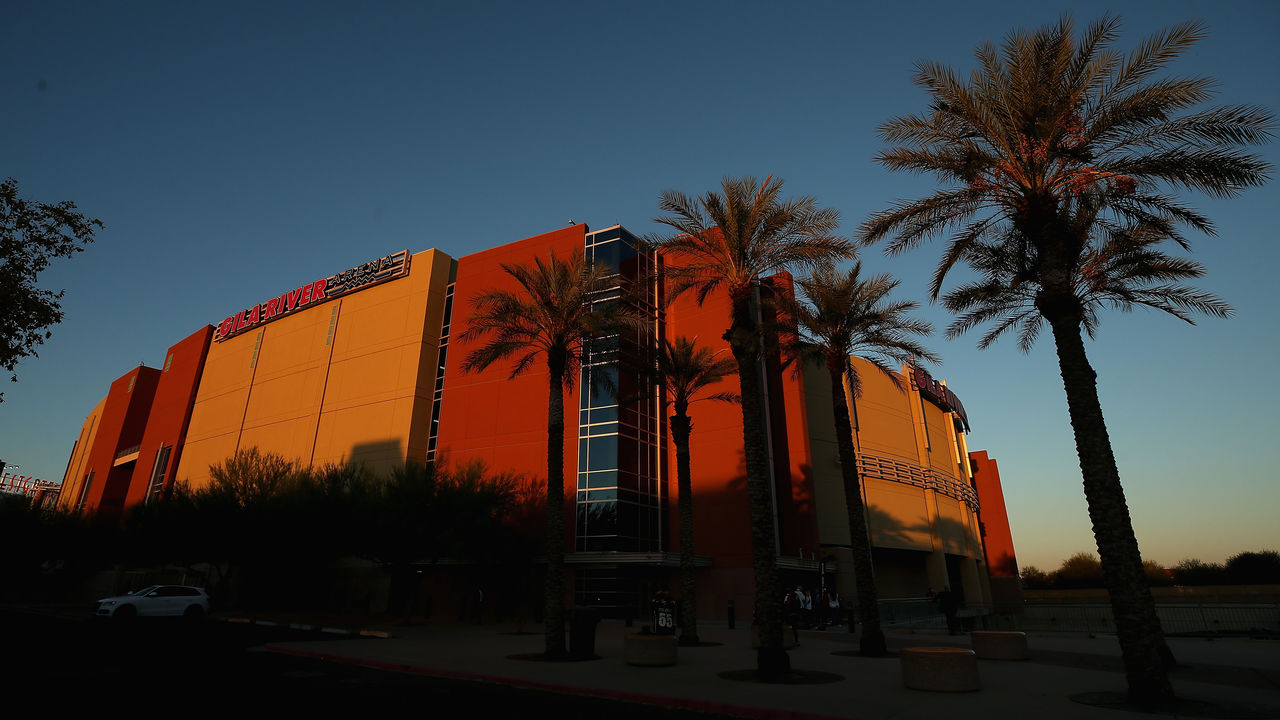
Clearly, this isn't what NHL hockey in the state was supposed to look like. Things have cascaded for a quarter-century, starting at the rink in downtown Phoenix with all its obstructed seats.
The Coyotes' first home venue - America West Arena, now known as the Footprint Center - opened in 1992 to house Colangelo's basketball Suns. When hockey was later transposed onto the playing surface, some seats hovered over the boards, meaning 4,200 patrons couldn't see the nearest net. Andrew Kulyk and Peter Farrell, sports superfans who road-tripped in the early 2000s to every NHL arena, panned this layout when they ranked America West the worst venue in the league: "They left Winnipeg for THIS???!!!"
Player salaries swelled NHL-wide during Burke's ownership tenure. Losing millions annually, he sold the Coyotes in 2001 to developer Steve Ellman, who steered them to vacant farmland northwest of Phoenix. Glendale borrowed $180 million to pay for an arena, and Ellman pledged to turn the expanse into an entertainment hub. Ellman's purchase of the Coyotes stopped Paul Allen, the late Microsoft co-founder, from striking a deal to move them to Portland. Yet relocation chatter resurfaced when Ellman sold the club to Jerry Moyes, the trucking magnate whose business floundered during the 2008 recession, and who owned the Coyotes when they lost more than $50 million that year alone.
This cast a pall over Gretzky's association with the team. A partner in Ellman and Moyes' ownership groups, The Great One named himself head coach following the 2005 lockout but missed four postseasons as the likes of Roenick and Curtis Joseph - superstar peers of his in the '90s - proved to be past their primes. (Then-assistant Rick Tocchet was accused during this period of running an illegal sports betting venture. He took leave from the team, pleaded guilty to the charges, and was sentenced to probation before returning to the Coyotes as head coach in 2017.)
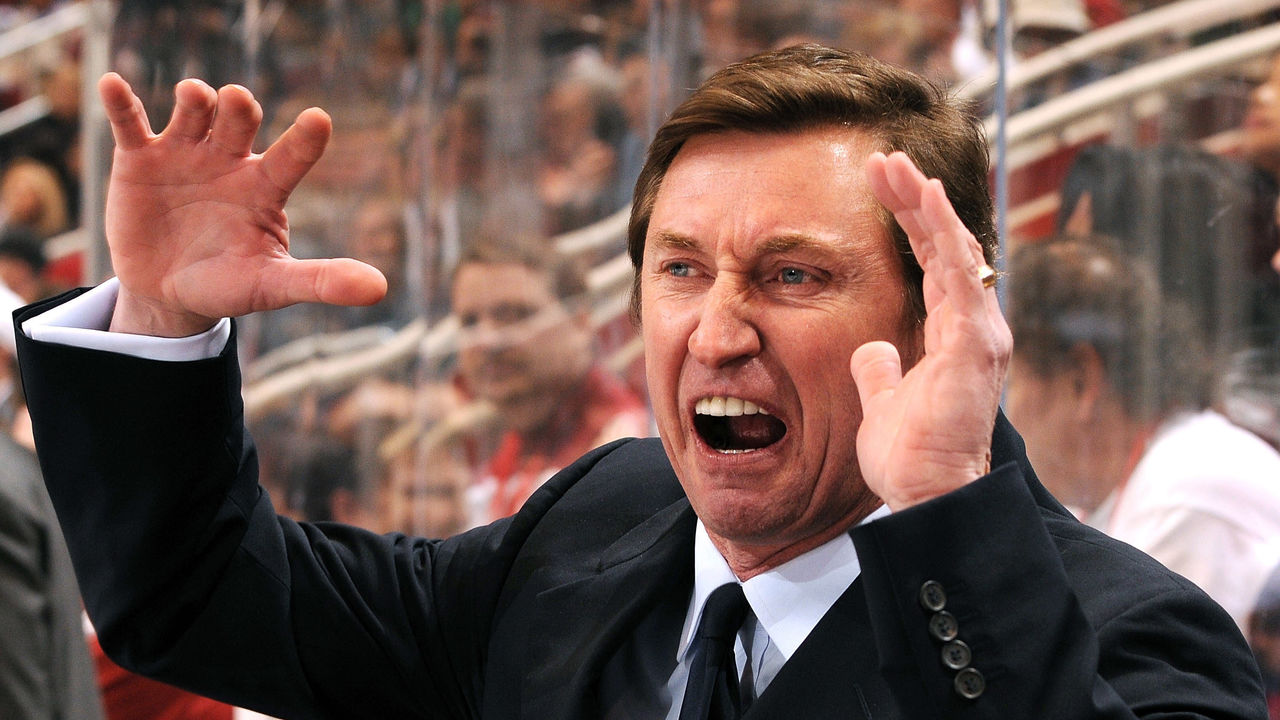
Gretzky spent part of his last season behind the bench, 2008-09, searching for investors to relieve Moyes' losses. If not for Gretzky championing the market, the Coyotes might have left Arizona years earlier, his personal business manager told The New York Times.
Moyes filed for bankruptcy in 2009 in order to sell the Coyotes to Jim Balsillie, the BlackBerry phone manufacturer, who wanted to move them to Hamilton, Ontario, against the NHL's wishes. An Arizona judge ruled that this violated NHL rules, prompting Moyes to offload the team to the league. It took the NHL until 2013 to secure a buyer, at which point Glendale council approved a 15-year arena lease that the city broke within two years. Bettman and the team then started angling to leave Glendale. When the council decided this summer not to renew the club's revised, year-by-year lease, it meant the Coyotes will be evicted June 30, 2022.
Meantime, this happened in the last 15 months:
- John Chayka's GM tenure, which ended when he quit in July 2020 right before the Coyotes entered the Edmonton playoff bubble, resulted in Arizona forfeiting high draft picks as punishment for testing prospects before the NHL combine. The league also suspended Chayka through the end of 2021 for detrimental conduct, reportedly because he pursued other jobs while under contract.
- The Coyotes drafted Mitchell Miller in October 2020, then renounced his rights within the month, acknowledging to the Republic that the team knew before the draft that Miller bullied a Black developmentally disabled classmate in junior high.
- Last winter, The Athletic's reporting about organizational tumult under owner Alex Meruelo unearthed claims that Meruelo has berated employees and that his associates have threatened vendors with litigation to reduce the team's due balances. The Athletic revealed that a law firm met with Coyotes employees to investigate alleged financial irregularities and workplace toxicity. The Coyotes declined to comment for the story but, after publication, framed the reporting as a "harassment campaign," writing in a statement that Meruelo has restored "integrity, honor, and professionalism" to team hockey operations.
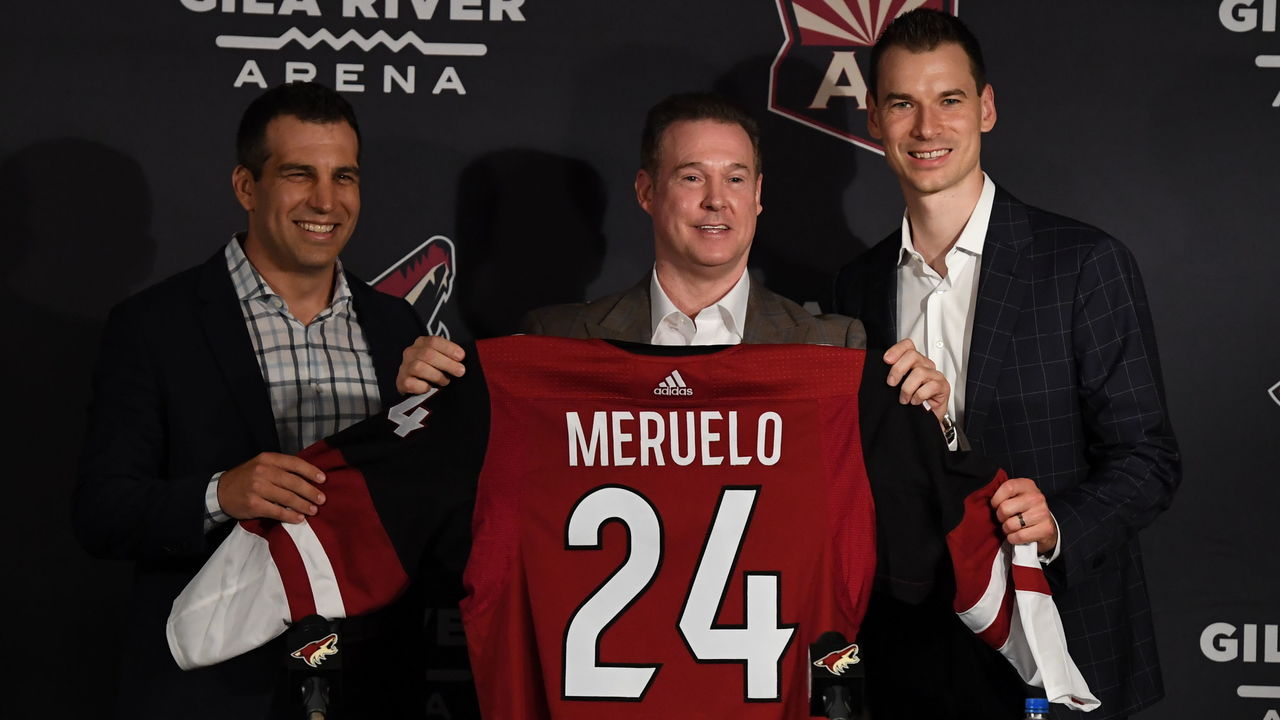
All the while, the Coyotes have normalized losing in Arizona. On New Year's Eve 2003, they blanked the Los Angeles Kings 4-0 to win in Glendale for the first time - and to launch Brian Boucher's league-record shutout streak. The journeyman goalie stoned 146 straight shots over 332 minutes. When the streak ended, the Coyotes proceeded to win four of 20 games, and head coach Bob Francis was fired.
Momentarily unbeatable, Boucher's play defied what this team has always shown itself to be. Even when the Jets' transplanted roster remained competitive in Phoenix, the Coyotes were eliminated in four consecutive first rounds, twice in Game 7. In two fewer seasons of existence, the Nashville Predators have amassed more total points in the standings. Since the start of the salary-cap era in 2005, only the Edmonton Oilers, plus the four-year-old Vegas Golden Knights, have earned fewer points than the Coyotes. At least Edmonton has won four draft lotteries.
"It's difficult to embrace a new team as one's favorite, especially when there is no compelling reason to do so," longtime Glendale councilor Joyce Clark wrote in a recent blog post about the Coyotes' history in the city.
"What would constitute a compelling reason to become an avid fan?" Clark asked. "It's pretty obvious. A good team … a winning team."
Booted out of Glendale and needing a new home at season's end, the Coyotes have fixed their sights on Tempe, the suburb 10 miles east of downtown Phoenix. In September, the team bid to develop city-owned land into an arena and entertainment district not far from Arizona State University, on the south bank of the Salt River. City staff plans to evaluate the bid for several months before submitting its thoughts to the city council. If the council ultimately green-lights the Coyotes' proposal, construction would take years.
Where they'll play in the meantime is unresolved. The Coyotes and Bettman have reiterated that they plan to keep the club in Arizona. Local hockey reporter Craig Morgan has surmised that the likeliest interim destinations are in Phoenix, be it the 13,730-seat Arizona Veterans Memorial Coliseum or Chase Field, the domed home of MLB's Diamondbacks. Returning to the NBA arena is off the table, Morgan reports, since current Suns owner Robert Sarver has long signaled he doesn't want that to happen.
Starting fresh is also an option, like Balsillie envisioned in 2009.
To Matheson, the sports economist, it's rational to wonder why the Coyotes wouldn't relocate. Toronto and Montreal could each support a second franchise, he said, though Maple Leafs or Canadiens ownership would kibosh the idea. Quebec City bid for a team in the expansion process that netted Vegas the Golden Knights. Houston is populous, has an NHL-caliber barn in the Toyota Center, and would spare the league the poor optics of leaving the American south. Hypothetically, Kansas City's T-Mobile Center could house hockey, too.
"At least when you move to a new city, you get five years or so of a honeymoon effect," Matheson said, referring to the wave of fan engagement that Vegas, for instance, is riding and hoping it'll be able to sustain. He thinks Tempe is too close to Glendale to spark that wave, snap the cycle of fan apathy, or justify building another arena in Phoenix's shadow.
"It's just hard to imagine some sort of phoenix rising out of the ashes - in Phoenix - for a hockey team that has failed to capture the love of the area in the last 25 years," Matheson said. "(If not for) seeing the reluctance of them wanting to move it when it was bankrupt 12 years ago, that's where I would be looking. But I'm not at all confident that that's actually going to happen."
Change was afoot in Arizona this offseason, sartorially and everywhere on the ice. The Coyotes restored the kachina logo as their primary jersey emblem. They hired Andre Tourigny from the junior Ottawa 67s to replace Tocchet as head coach. They traded Conor Garland, Oliver Ekman-Larsson, and Christian Dvorak for burdensome contracts and/or plum draft picks. They've stockpiled three first-round choices and five second-rounders in 2022.
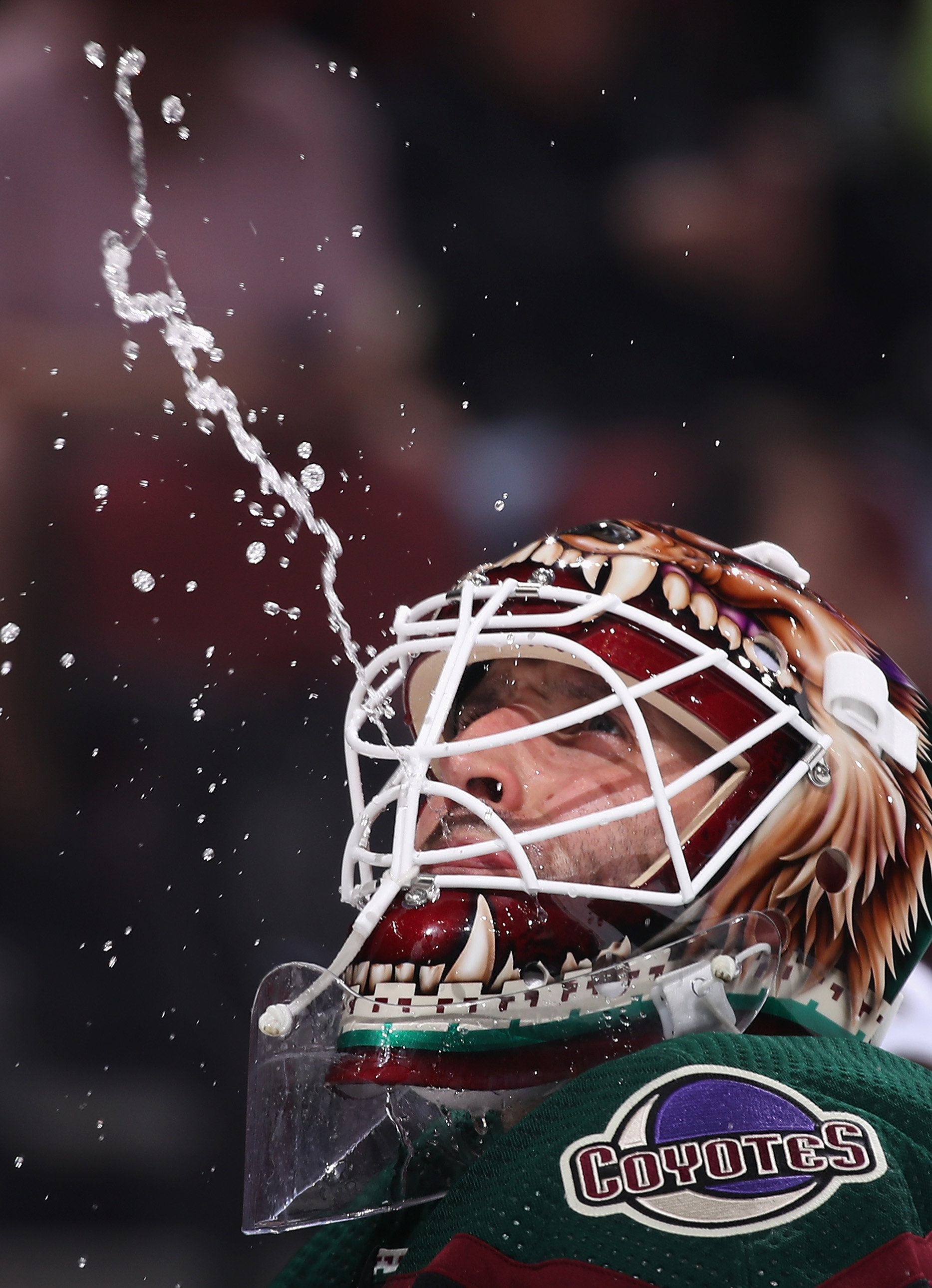
Now that Darcy Kuemper, Antti Raanta, and Adin Hill are gone, 35-year-old Carter Hutton is Arizona's stopgap goalie, one of 13 pending unrestricted free agents on the team's cap sheet. The Coyotes have only seven NHL players signed beyond next summer, per CapFriendly. The rebuild is young and tethered to Jakob Chychrun and Clayton Keller's continued growth.
Arizona is also in a new division, having relocated from the Pacific to the Central to accommodate the Seattle Kraken. Included in the Coyotes' divisional opponents this season: the Winnipeg Jets.
Early in 1996, before the original Jets left Winnipeg, the Coyotes' first employee in Arizona established roots there. Working 15-hour days in his America West Arena office, Shawn Hunter wooed broadcast partners, season-ticket holders, and corporate sponsors, making it so that Coyotes branding was inescapable for a time in Phoenix. It adorned Coke bottles, Budweiser 12 packs, and Bank of America ATM screens. Skeptics said he couldn't "sell hockey in the desert," he told the Republic back then, but he could see it becoming one of the country's most electric markets.
Reached by phone recently, Hunter reminisced about nights when the vision felt sustainable. One was the home opener when the heat spiked outdoors and the crowd howled. There were the Coyotes' first home playoff games in April 1997, a couple of wins and a costly overtime loss against the Mighty Ducks of Anaheim. They felt like Stanley Cup contests in Round 1, Hunter told theScore. Fans came dressed in white and promotions staff handed T-shirts to the forgetful, 16,210 Arizonans uniting to carry on a Winnipeg tradition.
Without ever vying for the Cup, the Coyotes have helped grow the game in Arizona. When Richard Burke sold the franchise in 2001, his family retained ownership of Ice Den Scottsdale, the Coyote practice facility that houses adult and youth games, skills development sessions, and a popular learn-to-skate program. Taylor Burke, Richard's son and the Coyotes' first assistant general manager, continues to run the Ice Den's parent company. He's seen scores of young athletes discover hockey and stick with it, swayed by that potent blend of ice time and NHL fandom.
"The ultimate unicorn example is a guy like Auston Matthews," Taylor Burke said, referencing the NHL star's Scottsdale upbringing and choice to pursue hockey instead of baseball. "But I think there are hundreds and thousands more who are playing the sport here in Arizona because they had the opportunity to go to games as a kid. That exposed them to something that they may not have otherwise seen."
Not long after the Burkes moved on from the Coyotes, Hunter left the organization, becoming the president of sports at the L.A. Kings' parent company. More recently, he founded the Chicago Dogs, a minor-league baseball team in the independent American Association. His job is to sell irreverent family fun. He's friends with the owner of the league's winningest team, which happens to play in Winnipeg.
Observing the Coyotes from afar, Hunter's opinion on the Tempe bid differs from Matheson's. By the early 2000s, as he sees it, the team needed to leave America West Arena and its obstructed seats, despite having cultivated meaningful support in the nearby East Valley. A lot of the fans who gravitated to Roenick and Tkachuk in 1996 - who showed up when pushing for the playoffs was the norm - lived in Tempe. Maybe the Coyotes can build something there. Maybe the ideal they were founded to chase is still in reach.
"I would hope that at Year 50, they're looking back at full arenas and a few Stanley Cup victories," Hunter said. "And for people to point to the Phoenix metropolitan area as one of the top markets in the league."
Nick Faris is a features writer at theScore.